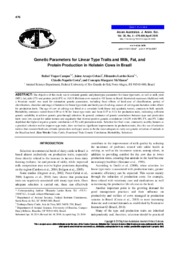Genetic parameters for linear type traits and milk, fat, and protein production in holstein cows in Brazil.
Genetic parameters for linear type traits and milk, fat, and protein production in holstein cows in Brazil.
Author(s): CAMPOS, R. V.; COBUCI, J. A.; KERN, E. L.; COSTA, C. N.; McMANUS, C. M.
Summary: The objective of this study was to estimate genetic and phenotypic parameters for linear type traits, as well as milk yield (MY), fat yield (FY) and protein yield (PY) in 18,831 Holstein cows reared in 495 herds in Brazil. Restricted maximum likelihood with a bivariate model was used for estimation genetic parameters, including fixed effects of herd-year of classification, period of classification, classifier and stage of lactation for linear type traits and herd-year of calving, season of calving and lactation order effects for production traits. The age of cow at calving was fitted as a covariate (with linear and quadratic terms), common to both models. Heritability estimates varied from 0.09 to 0.38 for linear type traits and from 0.17 to 0.24 for production traits, indicating sufficient genetic variability to achieve genetic gain through selection. In general, estimates of genetic correlations between type and production traits were low, except for udder texture and angularity that showed positive genetic correlations (>0.29) with MY, FY, and PY. Udder depth had the highest negative genetic correlation (-0.30) with production traits. Selection for final score, commonly used by farmers as a practical selection tool to improve type traits, does not lead to significant improvements in production traits, thus the use of selection indices that consider both sets of traits (production and type) seems to be the most adequate to carry out genetic selection of animals in the Brazilian herd.
Publication year: 2015
Types of publication: Journal article
Unit: Embrapa Dairy Cattle
Keywords: Functional Trait, Selection, dairy cattle, genetic correlation, heritability
Observation
Some of Embrapa's publications are published as ePub files. To read them, use or download one of the following free software options to your computer or mobile device. Android: Google Play Books; IOS: iBooks; Windows and Linux: Calibre.
Access other publications
Access the Agricultural Research Database (BDPA) to consult Embrapa's full library collection and records.
Visit Embrapa Bookstore to purchase books and other publications sold by Embrapa.

